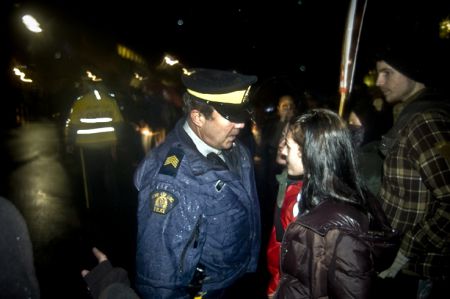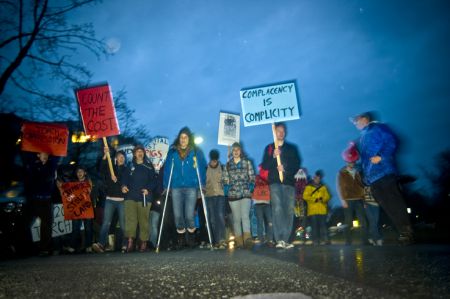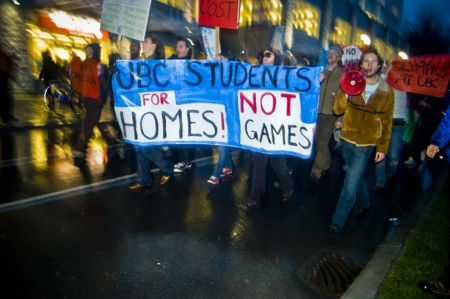STORY about Media posted on February 12, 2010 by Moira Peters
Cops Get Hands-On Early in the Game
BCCLA offers third-party observation at Olympic resistance actions
One protester was arrested, according to reports, and witnesses claim police used excessive force just prior to the Olympic torch's arrival on UBC's campus this evening, where a group of 100 to 200 people gathered to protest the torch relay.
"We observed some strong police reactions that came out of nowhere," said Stefanie Ratjen, Program Director for the BC Civil Liberties Association (BCCLA) Legal Observers, after her team had debriefed the events of the evening.
"I have yet to review all the tapes and write the report, but there were a few cases where people said they were pushed, and one woman said she was thrown by police."
BCCLA observers video taped, photographed and kept written notes during the protest, which began on campus at the Goddess of Democracy statue, occupied the UBC bus loop, and culminated at the intersection of Main Mall and University Boulevard where police blocked protesters from occupying the intersection. Observers also attended the night market along University where a large umbrella-ed crowd awaited the flame to cheer it on.
The protest grew in volume and energy as the torch approached the intersection. Demonstrators chanted, "Homes, not Games," "No Olympics on stolen Native land," and "VANOC off our campus."
Morghain Gibbons, a UBC engineering student from Edmonton, held a sign in the rain that said, "UBC Students Do Not Approve." She said she was protesting the torch relay because the torch represents the "whole package" of the Olympics.
"Vancouverites are being misled about the benefits of Olympics," she said. "Our education is suffering; there's environmental damage; there's more homelessness; our civil liberties are being compromised."
Buses are being rerouted; classes are canceled for two weeks around the Olympics; and students are losing money because their summer is being cut short by two weeks – two weeks when they could be working, she said.
Vancouverite and UBC student Aylom Kone said he was protesting because the torch is symbolic of the displacement of people, gentrification and surveillance in Vancouver because of the Games. These, he said, will last long after the Games have left.
"It's a question of economics. It'll cost more for the city to take the cameras down, so they're not going to," he said. "In the case of the Downtown Eastside, this means an increased surveillance of people's private lives, where a lot of people live in public, on the street."
Camille Barth, a UBC arts student from Los Angeles, said she was there to cheer on the torch, but she heard from friends that the Olympics was diverting money from women's shelters, and her dad told her the LA Times reported money being taken from homeless shelters because of the Olympics.
But, she said, "The Olympics is the Olympics." For her, the torch represents hope, and attaining the unattainable through perseverance.
Miranda Mann, a field hockey player and UBC human kinetics student from Vancouver Island, said the torch is inspirational because athletes dedicate their lives to the love of sport.
Kone said he believed the reason so many people support the torch relay is because the whole story is not getting out to people.
"First, criticism is shut down. Public media is not exposing people to the things that would probably make them question the Olympics. Second, there is a large population of Vancouverites working for VANOC – people who, for economic reasons, even though they are opposed to the Olympics, can't not work when they get the opportunity. So it's a conflict."
Organizers of the demonstration were pleased with the turnout, especially, they said, given the challenges of organizing on such a large campus where students tend to be disengaged with movements such as resistance to the Olympics.
Along with its mandate to offer third-party objective evidence in the case of altercations during Olympics resistance actions, Ratjen hopes the legal observer program will raise awareness of these events. By documenting "what they see as it happens," especially with respect to the reactions of police and security personnel to protests during the Olympics, observers offer the public an accurate, unbiased picture of people exercising their democratic right to dissent.
****
BCCLA will host "coffee with civil liberties" every day at 8 am at their office at 1188 West Georgia Street in Vancouver. At these press conferences they will present their reports and videos from the previous day. Photographs by insurgentphoto.
The site for the Vancouver local of The Media Co-op has been archived and will no longer be updated. Please visit the main Media Co-op website to learn more about the organization.


